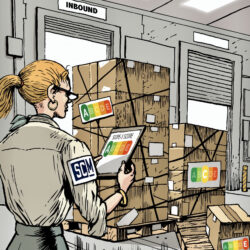Difficult choices about sustainability

In the past year, the European Union (EU) has adopted various sustainability directives, such as the Corporate Sustainability Reporting Directive (CSRD), the Corporate Sustainability Due Diligence Directive (CSDDD) and the Carbon Border Adjustment Mechanism (CBAM), which will affect many companies in the coming years. These directives were drafted and subsequently adopted because of the EU climate targets to be met.
The underlying concepts make sense; if every company starts managing its Scope 3 emissions, and also holds its suppliers accountable, this will eventually lead to lower emissions throughout the supply chain. But implementing these EU directives poses a challenge for companies. It is going to take effort, time and money to do so. So what choices do companies have in terms of dealing with this?
There is a small but growing group of companies that see sustainability as the basis of their business strategy. For these companies, the new directives are in line with what they have been doing for a long time and they will enthusiastically embrace them. These companies may even put too much effort into it and may need to be slowed down, so to speak.
Another group of companies will accept and rise to the challenge of the new directives, simply because of the future obligation. They will start by setting up the internal organization, collecting data and possibly purchasing software to help them.
Wait-and-see approach
However, there will also be companies taking a more wait-and-see approach. They are wondering whether these directives really are a ‘must-do’ topic, or whether things won’t be as bad as expected. After all, there have been other hypes that subsequently turned out to be less ‘hot’ (think of the Y2K hype about computer systems not being able to cope with the date changing from 1999 to 2000). In addition, there are already signs that the winds of change may be blowing through the EU; farmers’ protests in the run-up to the EU elections led to certain sustainability legislation being repealed. Also, the composition of the EU parliament has now changed, which could lead to weakening of sustainability legislation.
These companies know that the EU directives will be phased in over the next few years, so they can choose to ‘wait and see’. Practical reasons for such a choice are easy to find: the in-house auditor, for instance, will not yet be able to specify what requirements will be imposed on CSRD reporting. No doubt there are also certain business objectives that take more priority. In short, doing nothing is also an option.
Beliefs and emotions
However, what companies need to consider when making these choices is what their employees think. Because while reasoning plays an important role in many business decisions, sustainability is also about beliefs and emotions. My question to you as a supply chain professional is: What do you believe in? What do you feel your company should be doing, and does that align with the choices it makes?
Lex Kop, supply chain consultant, sparring partner and project manager










